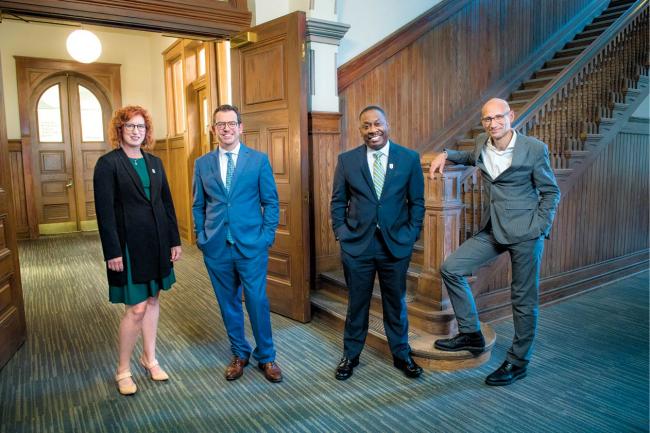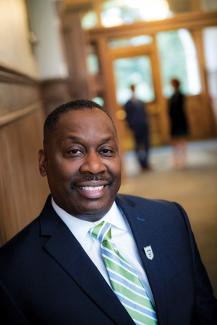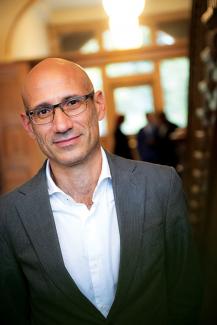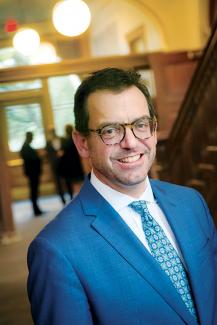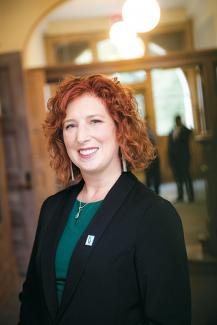Brian Edwards, the new dean of the School of Liberal Arts, likes to build things.
After earning a PhD from Yale University, Edwards spent 18 years at Northwestern University, becoming a full professor of English, comparative literary studies and American studies. At Northwestern, he founded — and built — the highly regarded Middle East and North African (MENA) Studies program.
Edwards is an interdisciplinary scholar, fluent in four languages — Arabic, French, Spanish and, of course, English. His first book, Morocco Bound, is “a cultural history of how Americans came to think about the Arab world, during the period when the U.S. emerged as a global superpower,” he said, roughly from the beginning of World War II through the Vietnam era. His most recent book, After the American Century: The Ends of U.S. Culture in the Middle East, moves to the present era, examining the 21st century and the impact of digital technology on American relations with the Middle East. “In this book, I address the apparent paradox that U.S. culture — from Hollywood and hip-hop to YouTube and Facebook — became increasingly popular in the region while the political reputation of the U.S. plummeted,” Edwards said. The book was based on extensive field research in Egypt, Morocco, Lebanon and Iran over a decade and was published in 2016.
Tulane’s commitment to interdisciplinary education and its focus on the research mission are big reasons why Edwards decided to join the university. “I think of the connection between Tulane and New Orleans as vital. Though it is well known and runs through the history of the university, I think the relationship between the city and the institution is still under-imagined,” he said. “There’s a lot of potential for another generation of thinking about what it means for Tulane to be in New Orleans and what New Orleans means to both the university and the nation and world at large.”
New Orleans and Tulane are global ports, said Edwards. That Tulane is located in New Orleans, a multilingual city with both major urban challenges and innovative approaches to solutions to those challenges, is “what makes Tulane arguably the most important and exciting university to be at right now.”
A passionate advocate for the liberal arts, Edwards said that the humanities, social sciences, and fine and performing arts have a major role to play “in an era in which truth itself has been put into question.”
“A liberal arts education is, to my mind, the greatest training for an increasingly and ever complex world,” he said.
At the School of Liberal Arts, “we’re teaching complex thinking. We’re teaching creativity. We’re teaching how to think.
“Teaching complex thinking is great training for all students, whether they’ll pursue technology, medicine, finance or the fields that more immediately emerge from our disciplines: policy, government, the arts, entertainment, etc.”
He expects that a new generation of students who are “technologically savvy, creative, both frustrated with the world they have inherited and optimistic at the same time,” will think anew about questions of inequality, poverty, education and environmental challenges.
“Great research universities have always had the major liberal arts disciplines at their heart,” he said. “The School of Liberal Arts contains disciplines that are among the oldest ways we’ve organized human knowledge and experience such as philosophy, history, literature and interdisciplinary programs at the forefront of thinking.”
The social sciences like economics, sociology, anthropology and political science are vital for understanding human experience and society and offer “models and alternatives to the accepted or inherited ways of doing things.” The cultural expression and beauty of the fine and performing arts are also at the heart of the university, said Edwards. “They are part of what makes life worth living.”
His vision for Tulane is that it will become, nationally and internationally, further recognized as a place “where you come to study and where you look for expertise and comment.”


